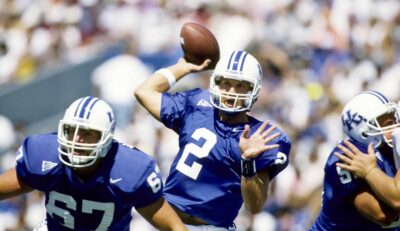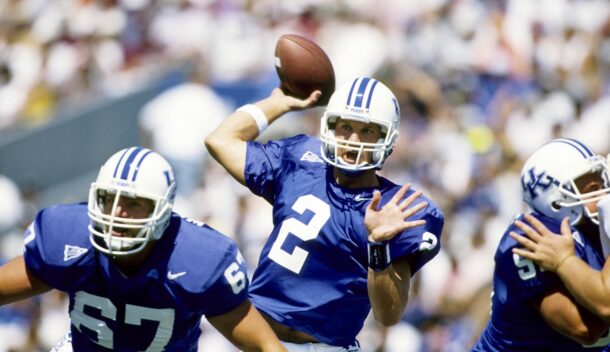HOOVER, Ala. — Most, if not all, of the SEC’s 14 head coaches fielded questions on some controversial subjects this week at the conference’s Media Days.
Facing queries about domestic violence and the Confederate flag, all of them leaned into very public microphones and confronted the questions head on. (OK, so not all of them — see Dan Mullen’s response below.) I think that’s something for which SEC fans can be proud.
Here are some of the league’s most powerful men responding to two significant issues that are both ethical and political to varying degrees. Some of the questions have been edited for clarity and brevity.
ALABAMA COACH NICK SABAN
With you and the Alabama governor being such good friends, how do you feel about the decision he made to remove the Confederate flag from the capitol grounds?
“My opinion is any time we have a symbol that represents something that is mean-spirited or doesn’t represent equal rights for all people, I’m not for having that symbol represent anything that we’re involved in.
“It’s not my decision as to what the governor does or my decision what our university does, it’s just my opinion about the way I feel about symbols that are not positive toward human rights and everybody having equal opportunity.”
Do you regret the Jonathan Taylor situation? And what are your thoughts on the new SEC rule that doesn’t allow schools to take players with domestic violence issues?
“First of all, we don’t at all condone any kind of domestic violence or any kind of violent behavior toward women. But I do think that this is an emotional issue that’s very, very complicated. It’s against the law, and we respect the law, and we will continue to do things that respect the law and our organization.
“Because this is a complicated circumstance, we should be creating as many opportunities to try to solve this problem and use this as an opportunity to try to solve this problem with young people, male and female alike, because this is an issue across the board with any emotional relationship. And I would be very supportive if, as a league or as an institution, we did some of those types of things so that we could better manage this in the future.
“Being specific to Jonathan Taylor — and I’ve answered this before — I do not regret giving players opportunities. This is an opportunity that we gave a player that didn’t work, but in fairness to the player, he didn’t really get the kind of due process before he was judged as any person should.
“But it is what it is. We’ve all moved on. He was in zero tolerance, and therefore, we’ve moved on. We do not condone that kind of behavior in our program.”
SOUTH CAROLINA COACH STEVE SPURRIER
I know this is a sad subject, but how did the murders in Charleston affect you? And what was your reaction when South Carolina took down the Confederate flag?
“Well, it was a tragedy, obviously, (for) nine innocent people to be killed like that. I applaud our governor for setting the initiative to remove the flag, and obviously it was received very well by just about everyone in our state and around the country.
“Obviously, all of us in college sports, we know the importance of equality, race relations, everybody getting along. So certainly, I think all the coaches all over — I know all over South Carolina (were) happy and glad to see the flag come down.”
Nobody’s arguing against the SEC’s new transfer rule relating to domestic violence, but do you worry that, if other conferences don’t adapt the same standard, there’s a bit of a competitive disadvantage?
“I’ve heard some coaches say that. I guess potentially it could be a little bit. But the SEC has their rules, and we live by them.
“Our rules are different on that satellite camp issue also, and where a lot of the Big Ten teams came into the South, into Texas, into Florida, and set up a camp and so forth. SEC rules are against that also.
“Yeah, you could be, but I don’t know. We all got 85 scholarships. We all got a chance to get 85 players. Try to train them, coach them, develop them, be the best you can be. So that’s just the way it is.”
OLE MISS COACH HUGH FREEZE
What are your thoughts on changing the state flag? And also, do you think the Ole Miss nickname is appropriate?
“In the late ’90s, our school made a move in a direction away from the flag. So our school has kind of made up its mind of where it’s at. I’m a Mississippian. No one understands the pride of the people of that state and the heritage of that state any better than I do. While I’m not a political figure, that symbol has been hijacked somewhat by groups that have meant ill will toward other people. I think it’s time that we move in a different direction with the state flag.
“We could get into the name of the Rebels and everything, and if that’s something that is troublesome to others, I’m sure that we would address that. I haven’t heard that.”
You’ve said a couple of times that the flag was hijacked. Do you really believe that it was hijacked as opposed to the original meaning of the flag? And secondly, what do you think your role is as a head football coach in talking about this at all?
“Like I said, I’m not a political figure, nor do I want to be. I’m sure our governor and the legislation will hear from the people. But in the world in which I live in, if something that is creating ill will in any way toward someone, it’s difficult for me to support that.
“As far as comparing what the original meaning meant, I’m going to have to go study some and make sure I’m speaking out of knowledge as opposed to — I know the people that I grew up around. I did not see them using it in ill will toward anyone, but obviously, I was raised at a much later date. I do think that it’s been associated with people that have meant some harm and ill will.”
MISSISSIPPI STATE COACH DAN MULLEN
Mississippi remains the only state on the NCAA’s postseason ban because of the Confederate flag’s presence on the state flag. What’s your opinion on the current state flag?
“That’s a lot for the people in Jackson and for the people in Mississippi. I don’t see it very often. We don’t have it on our campus up.
“I do know we’re the most diverse campus in the Southeastern Conference. I know the university embraces that diversity as a whole. I certainly embrace that diversity. We’re so diverse, they have a Yankee as a head football coach in the Southeastern Conference.
“I think that’s something that on a national level is getting an awful lot of attention right now, that people are really looking into how we can make things better in the state of Mississippi. And I hope as a university we’re out on the forefront trying to help make things better with the type of school that we have and the diversity we have in our school.”
GEORGIA COACH MARK RICHT
Why do you think it was important to have the transfer rule regarding domestic violence? And do you think the SEC needs standards for other offenses?
“Well, I think that one was pretty cut and dry, and I’m not the one who made the decision at all, but I certainly agree with it. That’s a good thing to have as a stipulation for our league.
“The bottom line is it’s hard to — just even as a coach and being in charge of 125 young men year after year after year, if a guy makes a mistake, there’s not a book you can open that says, ‘If he does this, you do that. If he does that, you do this,’ and all of that type of thing.
“So there’s judgment in everything. Even though you might have something that’s the same offense, there may be different circumstances. Until you know all the circumstances, it’s hard to make a wise decision. We’re put in a position to do the very best we can to make the best decision for the young man and for our programs and for our universities.
“Sometimes there are some things that are cut and dry, like a league policy or like a drug policy within the university system or within the athletic association, but there’s a lot of things that are left up to the discretion of a coach to decide or an AD or a president to decide. That’s where it can get challenging at times.”
KENTUCKY COACH MARK STOOPS
On domestic violence in college football as well as at Florida State:
“Each coach speaking with you all goes above and beyond in educating our players, and to put people in front of them that constantly talk to them and educate them about their actions, certainly with domestic violence but in all areas of their life. I promise you there are coaches who work diligently to help our players in all areas.
“Me personally, every case is different and you hate to just throw a blanket statement over anything, but there’s zero tolerance with domestic violence and hitting women in general.
“I know having spent three years at Florida State, I know the programs that coach Jimbo Fisher has in place to help his student athletes. that’s one thing I learned from Jimbo when I took the job from Florida State to Kentucky was how much he does to push for his players. He puts people there to help his players and to educate his players.
“I know how disciplined he is. It’s very unfortunate he’s dealing with some situations there as a program. I’m not up here with a need to defend Jimbo Fisher, but I’m just simply saying from my point of view, I took quite a few things from Florida StatE that he had in place to help our athletes be better people.”
MISSOURI COACH GARY PINKEL
On domestic violence:
“First of all, we’ve been touched by it like some other people, so we’ve been a part of this. I think a lot of positive things have happened in terms of what’s happened not only in college spots, but the NFL. All these negative things have happened in a lot of ways have turned into positives.”
An itinerant journalist, Christopher has moved between states 11 times in seven years. Formally an injury-prone Division I 800-meter specialist, he now wanders the Rockies in search of high peaks.







